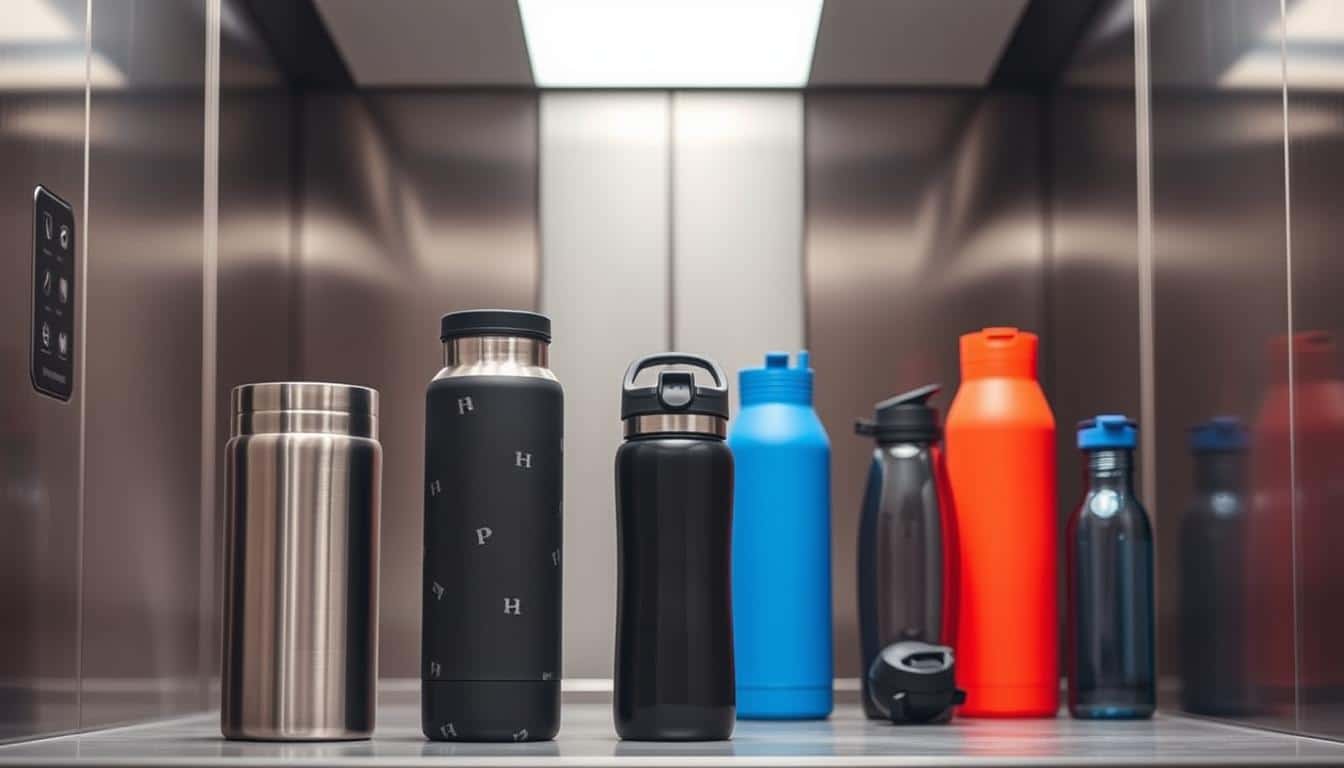Nowadays, it’s important for workplaces to support everyone’s dietary needs. This makes everyone feel welcome and respected. Some people need special diets due to health issues. It’s key for companies to know how to help, as guided by the Americans with Disabilities Act (ADA).
When businesses get this right, everyone benefits. Employees feel better and work better too. This introduction shows why it’s vital to choose our foods wisely at work. It’s all about making everyone feel included.
Understanding Elevator-Safe Diet Accommodations
Elevator-safe diet accommodations help meet the diverse dietary needs of employees. This ensures everyone can find safe food options at work. It shows respect for each person’s health and preferences.
These accommodations can make employees healthier and more productive. In buildings with limited elevator access, it’s vital to consider everyone’s dietary needs. Providing meal options that everyone can reach promotes wellness and takes care of employees’ unique diets.
Companies that actively work to meet dietary needs show they care about their team. This effort makes the workplace more welcoming for everyone. When people don’t worry about finding something safe to eat, they work better. This leads to a more focused and efficient team.
The Importance of the Americans with Disabilities Act (ADA)
The Americans with Disabilities Act (ADA) is a key law for disability rights in the U.S. It makes sure people with disabilities get the same chances in life. This includes making sure they are treated fairly at work. The law started in 1990 and got some updates in 2008. It has made a big difference in making workplaces more welcoming for everyone.
Overview of ADA and Its Implications
The ADA talks about what counts as a disability and how important it is for work to be fair. It says that jobs can’t turn down someone who can do the work just because they have a disability. Employers have to make changes so that people with disabilities can do their jobs well. This could mean changing how a job is done.
These changes help everyone by making work places more fair. This stops people from being left out just because they are different.
How ADA Influences Workplace Accommodations
ADA has changed how offices and companies operate, especially with what food they offer. They have to make sure they think about what employees who have disabilities need to eat. This makes the workplace better for everyone. And, showing they care about these needs makes everyone feel more welcomed.
Changes like offering different food options show respect for everyone’s needs. This helps make the office a better place to work. Looking at successful stories can inspire more companies to do the same.
Elevator-Safe Workplace Dietary Restrictions Accommodations
Creating elevator-safe dietary options is very important. It makes sure all employees can enjoy their meals without worry. These accommodations are for people with special dietary needs. They help make the workplace welcoming for everyone.
By adding these options to workplace meals, companies care for their employees’ health and safety.
Setting up elevator-safe meals means understanding what each employee needs. Here are some key steps:
- Assess employee dietary restrictions to identify specific needs such as allergies or intolerances.
- Develop a rotating menu that includes a variety of elevator-safe meals suitable for diverse dietary preferences.
- Communicate openly with team members to gather feedback about workplace dietary options.
Having various elevator-safe meals boosts health and safety. It also improves teamwork and morale. Everyone gets to eat together, making no one feel left out. This boosts well-being at work.
Identifying Dietary Restrictions in the Workplace
In a diverse workplace, understanding different dietary needs is key. Employers should consider how diet impacts employee health. Health conditions and personal choices influence what people can eat at work. By caring about this, employers make everyone feel important and part of the team.
Common Dietary Restrictions to Consider
Workplace meals need to consider several dietary limits. Among these are:
- Food allergies, like reactions to nuts, gluten, or shellfish
- Conditions such as diabetes, which affect carbohydrate consumption
- Choices to follow vegetarian or vegan diets
- Low-sodium diets for certain health issues
Knowing these dietary limits avoids health issues and promotes inclusivity.
The Importance of Open Communication
It’s crucial to talk openly about dietary needs at work. Employers need to make a space where employees feel safe to share their dietary preferences. They should also seek feedback often to keep up with everyone’s needs.
This conversation makes meal planning better. It also helps create a workplace where people care about each other’s health. Respecting each other’s dietary needs is key to teamwork.
Steps to Implementing Elevator-Safe Diet Accommodations
Creating a diet plan that’s safe in elevators takes careful planning and respect for workers’ needs. It’s crucial to talk to employees, gathering their insights on what they can and can’t eat. This way, any diet plan will include everyone and respect their dietary limits.
Consulting with Affected Employees
It’s important to ask workers about their diet needs. A few ways to do this include:
- Surveys to figure out what employees can and prefer to eat.
- Focus groups for open talks on diet needs.
- One-on-one talks for a clearer picture of each person’s requirements.
By talking to employees, you make everyone feel included and catered to. This effort shows your support and enhances meal choices at work.
Creating a Comprehensive Dietary Policy
It’s key to have a clear dietary policy in place. This policy must:
- Have guidelines that meet nutritional standards.
- Include specific plans for different diet restrictions.
- Ensure food safety to keep everyone healthy.
Sharing this policy well is crucial. It helps everyone understand and follow it, keeping the workplace safe and inclusive.
Examples of Elevator-Safe Dietary Options
Providing various elevator-safe dietary options makes food choices better for employees with dietary needs. It’s crucial to offer nut-free meals, gluten-free items, and low-sugar snacks. This ensures allergen safety and health in the workplace.
Nut-Free Options
Since nut allergies are dangerous, having nut-free meals is essential. Think about these options:
- Vegetable wraps with hummus and various fillings
- Chicken salads topped with sunflower seeds
- Quinoa bowls with roasted vegetables and vinaigrette
Make sure to label food clearly and have steps to avoid cross-contamination. Teaching about allergen safety lets employees choose safely.
Gluten-Free Choices
Offering safe, tasty gluten-free meals is vital for those who need them. Here are a few options:
- Grilled chicken or fish with steamed veggies
- Herb and spice flavored rice dishes
- Gluten-free pasta salads with veggies and olive oil
To keep foods gluten-free, use separate utensils and cookware. This prevents mixing and keeps meals safe.
Low-Sugar and Diabetic-Friendly Snacks
To help employees, especially those with diabetes, offer snacks low in sugar. You can choose these:
- Bits of fresh fruit like berries or apple slices
- Greek yogurt with a dash of cinnamon
- Vegetables with guacamole or salsa
By choosing these dietary options, companies create a welcoming workspace. They meet health needs of the workforce too.
The Role of HR in Facilitating Accommodations
HR plays a key role in creating a work environment that welcomes everyone. Through specialized training, they help employees grasp the importance of dietary restrictions. This understanding fosters a community that supports each other’s health needs.
Training and Awareness Programs
HR should put together training sessions that address dietary restrictions. These could cover:
- Workshops on food allergies and intolerances.
- Guidance on managing dietary restrictions during company events.
- Regular updates on best practices for meal planning.
This approach ensures everyone is aware and respectful of differing dietary needs. It makes employees feel valued and can boost their work performance.
Documenting Dietary Needs
Keeping detailed records of employees’ dietary needs is vital. HR must handle this process by:
- Collecting employee health records while respecting privacy considerations.
- Ensuring that dietary information informs meal planning and catering services.
- Establishing secure methods for managing sensitive data.
HR’s diligent documentation supports a culture of health and respect. It ensures all dietary needs are met safely and privately.
Addressing Challenges in Implementation
Bringing in elevator-safe dietary options at work comes with hurdles. Employees often worry about being labeled differently because of their diet needs. They fear the food provided won’t match their dietary requirements. Tackling these issues head-on helps create a welcoming space for everyone.
Common Employee Concerns
Workers may have fears about dietary changes. These worries often cover:
- Stigmatization related to special dietary needs.
- Perception of inadequate options available.
- Fear of making others uncomfortable with their dietary preferences.
Talking openly about dietary preferences helps solve these problems. Reassuring employees about the company’s dedication to including everyone helps too.
Potential Workplace Resistance
When starting dietary accommodations, coworkers or bosses might push back. Getting everyone on board is key. The resistance usually comes from:
- Lack of understanding regarding the importance of dietary inclusivity.
- Concerns about the cost of accommodating diverse dietary needs.
- A general resistance to change in workplace routines.
To manage changes effectively, build a culture of support and talk about concerns openly. Encouraging a setting that welcomes everyone lowers these barriers.

Best Practices for Meal Planning
Effective meal planning is key to an inclusive workplace dining area. It’s good to get an expert’s advice. This makes sure food meets everyone’s health needs. Adding a certified nutritionist or dietitian helps create meals for all diets.
Engaging a Nutritionist
Working with a nutritionist improves meal planning. They give advice that’s up to date with health and diet needs. Hiring a nutritionist comes with perks:
- Assessments of dietary needs and restrictions.
- Creation of balanced meal options that are both appealing and nutritious.
- Guidance on how to structure meals that accommodate different preferences.
Incorporating Variety and Flavor
It’s important to offer different meals for everyone to enjoy. This approach caters to various diets and keeps meals interesting. Enhancing meals involves:
- Using herbs and spices to elevate the taste of dishes.
- Offering a wide range of ingredients to ensure meals are not monotonous.
- Incorporating seasonal produce to maximize freshness and flavor.
Supportive Work Environment for All Employees
Creating a workplace where everyone feels valued and supported is important. This effort improves employee happiness and creates a culture that cares about health. Making sure the food options meet everyone’s needs is key. By focusing on including everyone, morale goes up and teams work better together.
Promoting Inclusivity
For a truly inclusive office, recognizing different dietary needs is crucial. By doing so, everyone feels healthier and more part of the team. Sharing meals from various cultures can also bring people closer. This makes the office environment more supportive and lively.
Encouraging Feedback and Adjustments
Listening to what employees say about food choices is essential for improvement. Making it easy to share thoughts helps update food policies quickly. Always seeking feedback shows a real dedication to helping employees stay healthy. Using surveys or feedback forms is a good way to check if people are happy with the food options.
Legal Considerations for Employers
Employers need to understand elevator-safe diet laws well. Knowing ADA rules is key to follow the law and avoid problems. They must know how these rules affect their work and what they have to do for their workers.
Understanding Liability and Compliance
Employers might face legal issues if they ignore ADA needs. Having ADA-friendly policies helps reduce the risk of legal troubles. To stay safe, they should:
- Regularly train their team on ADA rules
- Create a welcoming work environment for all diets
- Keep clear records of who needs what kind of food help
How to Avoid Discrimination Claims
Good practices lessen the risk of food-related discrimination complaints. Knowing and respecting worker rights is vital for a law-abiding workplace. Employers should:
- Teach workers about their rights to have their food needs met
- Have a system to hear and solve any food issues
- Always check and improve how they help with food needs to stay within the law
Conclusion
Making sure dietary needs are met is key to creating a welcoming workplace. By doing this, companies not only follow the ADA but also support employee health. This shows a strong commitment to all team members, helping them do their best at work.
Having elevator-safe accommodations benefits everyone at work. It boosts morale, work output, and keeps employees happy. Open conversations about dietary needs build a team spirit and a positive work environment.
It’s up to everyone from bosses to HR to lead the way in this. Working together to review and improve food choices ensures a company meets high standards. This approach makes a workplace fair and caring, showing it values all employees.



